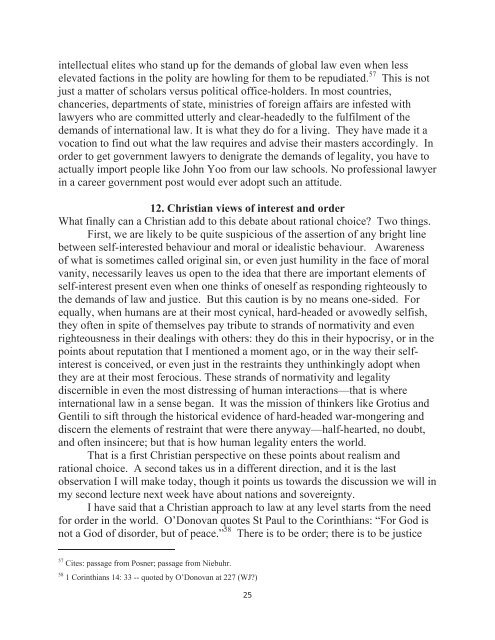International Legal Evangelism: Intelligence, Reconnaissance & Missions
International Legal Evangelism: Intelligence, Reconnaissance & Missions
International Legal Evangelism: Intelligence, Reconnaissance & Missions
You also want an ePaper? Increase the reach of your titles
YUMPU automatically turns print PDFs into web optimized ePapers that Google loves.
intellectual elites who stand up for the demands of global law even when less<br />
elevated factions in the polity are howling for them to be repudiated. 57 This is not<br />
just a matter of scholars versus political office-holders. In most countries,<br />
chanceries, departments of state, ministries of foreign affairs are infested with<br />
lawyers who are committed utterly and clear-headedly to the fulfilment of the<br />
demands of international law. It is what they do for a living. They have made it a<br />
vocation to find out what the law requires and advise their masters accordingly. In<br />
order to get government lawyers to denigrate the demands of legality, you have to<br />
actually import people like John Yoo from our law schools. No professional lawyer<br />
in a career government post would ever adopt such an attitude.<br />
12. Christian views of interest and order<br />
What finally can a Christian add to this debate about rational choice? Two things.<br />
First, we are likely to be quite suspicious of the assertion of any bright line<br />
between self-interested behaviour and moral or idealistic behaviour. Awareness<br />
of what is sometimes called original sin, or even just humility in the face of moral<br />
vanity, necessarily leaves us open to the idea that there are important elements of<br />
self-interest present even when one thinks of oneself as responding righteously to<br />
the demands of law and justice. But this caution is by no means one-sided. For<br />
equally, when humans are at their most cynical, hard-headed or avowedly selfish,<br />
they often in spite of themselves pay tribute to strands of normativity and even<br />
righteousness in their dealings with others: they do this in their hypocrisy, or in the<br />
points about reputation that I mentioned a moment ago, or in the way their selfinterest<br />
is conceived, or even just in the restraints they unthinkingly adopt when<br />
they are at their most ferocious. These strands of normativity and legality<br />
discernible in even the most distressing of human interactions—that is where<br />
international law in a sense began. It was the mission of thinkers like Grotius and<br />
Gentili to sift through the historical evidence of hard-headed war-mongering and<br />
discern the elements of restraint that were there anyway—half-hearted, no doubt,<br />
and often insincere; but that is how human legality enters the world.<br />
That is a first Christian perspective on these points about realism and<br />
rational choice. A second takes us in a different direction, and it is the last<br />
observation I will make today, though it points us towards the discussion we will in<br />
my second lecture next week have about nations and sovereignty.<br />
I have said that a Christian approach to law at any level starts from the need<br />
for order in the world. O’Donovan quotes St Paul to the Corinthians: “For God is<br />
not a God of disorder, but of peace.” 58 There is to be order; there is to be justice<br />
<br />
57 Cites: passage from Posner; passage from Niebuhr.<br />
58 1 Corinthians 14: 33 -- quoted by O’Donovan at 227 (WJ?)<br />
<br />
25

















